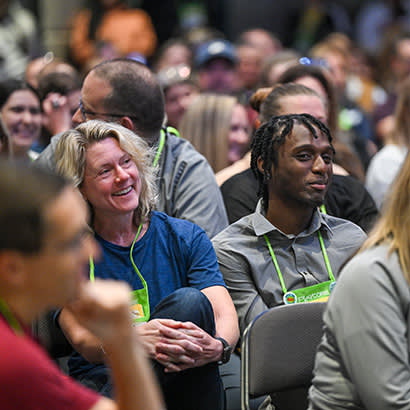
For an enhanced digital experience, read this story in the ezine.
My first park and recreation job was as a lifeguard in San Antonio, Texas. This job turned into many other jobs in the years that followed, including camp counselor, front desk attendant, janitor, sports instructor, coordinator and manager. One year I got a temporary injury that impacted my mobility; that was the moment when my supervisor introduced me to adaptive sports. I felt immediately at home, like I fit in, which became my anchoring experience of what an inclusive environment feels like. In this reflection, I share my curiosity about how inclusive environments are promoted in the context of a series of American Sign Language (ASL) classes held at the organizations where I worked. I have come to believe that environments tend to feel comfortable and welcoming because of anchoring experiences that create a shared understanding of what inclusivity feels like, such as an ASL course. I believe we can build a better world through our profession by pushing ourselves in new situations that improve our awareness of how another person might experience the world, being an inclusion practitioner who is open to learning when we get it wrong, and finding opportunities to build culture and community that celebrate, support and respect individuals.
Inclusion Through Connection
I like to frame equity, in my own life, as expanding awareness of my social world and how systems and norms in this environment came to be. I view inclusion as the specific actions I can take to celebrate, support and show respect for myself and individuals around me. Conversely, it seems a destroyer of an inclusive environment can be well-intended actions that come from misinformation or not relating to experiences that occur outside of our own.
While working at Texas Parks and Wildlife (TPW), I reached out to a nonprofit organization that offers American Sign Language (ASL) courses specific to the park and recreation profession. CorpsTHAT is a Deaf-owned and -operated organization with a mission “to connect the Deaf Community and the outdoors through education, recreation and careers.” I wanted to offer training to TPW staff that would serve them and our customers for a lifetime. What we got was much, much more.
TPW employees met twice per week as part of a 10-week online ASL course. The course was taught by an instructor who is deaf. The classroom was immediately recognized as a visual environment. My colleagues and I who are hearing noted the silence of this new environment as well as the stress to follow along with the conversations being had. This felt uncomfortable at first. My colleagues noted, “I realized immediately my assumption that those around me communicate in my preferred way. What a privilege! Now, I am in an environment where I am struggling to understand and be understood.” I instantly related to my colleagues’ experiences. I personally identify as a queer neurodiverse person, so on some level, I have learned to be flexible with how the world relates and reacts to me. However, these first few classes made a lasting impression on how I understand my own expectations and how I place those expectations on others — no matter how well-intentioned. The process of having this experience was impactful in a manner that, I think, most could benefit from.
Expanding Impact
I wanted to maintain my relationship with CorpsTHAT when I got a job at Northern Arizona University (NAU). It had been such a positive experience, and I wanted to share it with my new colleagues. They were pumped! Many of the same conversations about inclusion came up again. The NAU faculty were excited to learn ASL just like the TPW staff were. They agreed that an interesting thing happened as we understood more of the language. The classroom became less silent. In fact, when several of my classmates were signing ASL at once, it felt like chaos — like a room full of people talking over each other. We were beginning to understand a connection between personal growth, skill development and inclusivity. Like traveling and meeting new people, this class inspired me to continue to seek growth opportunities that expand my world view.
We began to create a work culture of signing ASL as more staff signed up for the ASL courses. TPW staff from the Deaf community began to engage with those who had taken the course. We also began to hear about field staff interacting with customers through ASL at state parks. In all instances, it felt as though community was being built with the acquisition of these new skills. It also seemed like this could be replicated with other skills that promote authentic interaction. This was not a research project — only my own observations and reflections. I am grateful for the work of CorpTHAT. They are building a better world.
Sandy Heath is Assistant Professor of the Parks and Recreation Management Program at Northern Arizona University.

